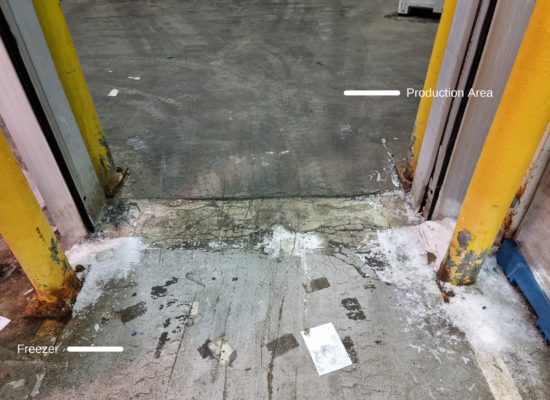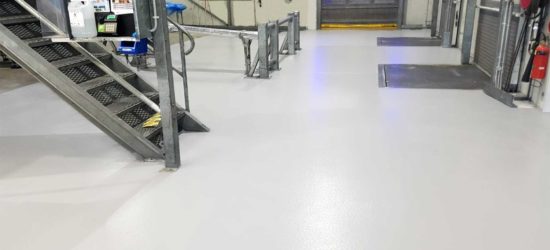The importance of thermal shock resistant flooring primarily stems from two common scenarios in food manufacturing facilities:
- A coolroom, freezer or blast freezer right beside a production area. In production areas, the room and by extension the floor temperature will range from around 10°C in meat processing areas to upwards of 20°C in a ‘hot kitchen’.
- Wash down of processing areas with water temperature around 68°C.
Aside from some rare exceptions, all matter expands under the influence of heat, and contracts with a lowering of temperature. The stress caused by this law of nature on a concrete floor is magnified in intensity in the two scenarios described above. With two adjoining sections of concrete floor being subjected to dissimilar thermal influences, floors can be seriously stressed, to the point of cracking.
With respect to the freezer scenario, there are a couple of important things to keep in mind. First, it is important to recognise that if an area is being repurposed to become a freezer or coolroom, cutting the floor and installing an expansion joint at the time of this change is very important. This allows for concrete movement (deformation), and significantly reduces the risk of the concrete cracking.
Another critical element is to ensure the installed floor surface expands and contracts at a similar rate to the concrete. Polyurethane cement flooring solutions react to temperature at a rate closest to concrete, due to the various properties of the solution. Epoxy solutions are not far behind polyurethane cements in this regard; however, they typically aren’t as resilient under temperatures exceeding 50°C (softening under hot water washdowns). Polyurethane cement floors the other hand with their specialised hybrid fillers and polymer content will tolerate temperatures of up to 120 °C (boiling water and steam), and when installed at higher thicknesses such as 9mm, they show insulating properties that can reduce thermal shock.
When installing a floor in a freezer, coolroom, or blast freezer, another important point is to ensure the flooring solution has excellent adhesion to the concrete. This is because any inadequacies in the interface between the substrate and the applied surface will be exposed under the stress of varying and differential temperature application, resulting in delamination and failure of the floor.
Polyurethane cement flooring solutions have exceptionally good adhesion to concrete, even in below 0°C temperatures. Similarly, Methyl methacrylate (MMA) has very good adhesion to concrete, and even at temperatures below -25°C can be mixed to cure in a matter of hours. Epoxy on the other hand does not bond well to cold concrete (typically 8°C minimum), and especially if the substrate has a higher than ideal moisture content.
While mentioning MMA in the previous paragraph, it is to be noted that while this product has excellent features such as a fast curing time, the ability to cure at very low temperatures, and good durability, the product has a very strong, pungent odour, which makes food manufacturers very hesitant to allow its use in their facility.
In regards to blast freezers, where the room temperature will go from temperatures exceeding 30°C, to -30°C within a very short timeframe, the flooring solution must be able to withstand this pressure, in being flexible, yet uphold it’s durability.
Polyurethane cement flooring solutions have been formulated to better withstand thermal cycling (hot, cold, hot, cold) and extreme changes in temperature making it the ideal system for not only blast freezers, but food manufacturing facilities where freezers/coolrooms are right by main production areas.
Our antimicrobial range of solutions, SteriFloor, contains four polyurethane cement systems; SteriFloor Stärke, SteriFloor Schützend, SteriFloor Beschützend and SteriFloor Schnell.
One final note of importance is that we cannot rule out the use of epoxy flooring solutions in food manufacturing facilities. There are many scenarios where epoxy solutions are ideal, particularly where a low but firm non-slip solution is required in areas where maximum hygiene requirements are to be upheld. Our SteriFloor range has two epoxy flooring solutions; SteriFloor Keimfrei, and SteriFloor Sauber.
For more technical information regarding thermal shock resistant flooring, please don’t hesitate to reach out to our team.







